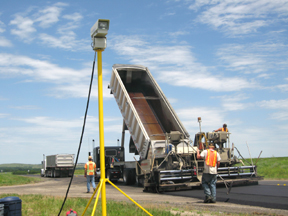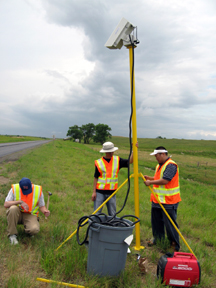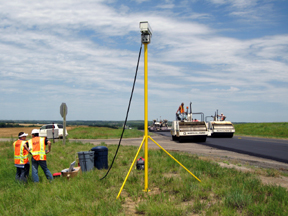Research to Measure Construction Productivity in Real Time

A University of Kansas engineering professor is researching ways to use technology to improve and speed up infrastructure reconstruction efforts.
After the September 11 terrorist attacks, hurricane Katrina, and the tsunami in South Asia and other extreme events, government agencies, engineering and construction communities, and the general public have paid close attention to rapid replacement of damaged infrastructure such as highways and bridges.
The ability of engineering and construction firms to meet these urgent public needs requires innovative technologies that help produce an accurate and reliable construction schedule that supports such rapid replacement operations, said Assistant Professor of Civil, Environmental and Architectural Engineering Yong Bai.
Previous research indicates that inaccurate productivity data lead construction managers to produce inaccurate schedules.

Bai is working to develop innovative technology systems that address the fundamental issue of how to improve the accuracy of on-site construction productivity data.
Sponsored by the KU Transportation Research Institute and KU's General Research Fund, Bai and his research team members are developing a prototype Wireless Real-tIme producTivity mEasurement (WRITE) system.
The system includes two video cameras, a data processor, an AC transformer, two antennas, and a laptop computer. Using this system, it is possible to measure the construction productivity in real time at the job site without interfering with construction operations. In addition the essential information can be sent to construction managers and engineers located as much as 20 miles away from the construction site. The first field experiment to test the effectiveness of the developed system was conducted in June on a U.S. Highway 36 work zone near Washington, Kan.

Results of the first experiment are promising. Bai and his research team, undergraduate research assistant Brandon T. Harvey and doctoral student Seonghoon Kim, expect to conduct more field experiments before the end of the year.
If successful, this research project will make several major contributions to the advancement of knowledge in the construction industry, Bai said. First, it will improve the accuracy of on-site construction productivity data. Second, it will develop new technology that is capable of automatically measuring productivity data in real-time. With these advancements, construction managers will be able to develop an accurate and reliable construction schedule for rapid construction operations. They also will be able to modify the schedule when changing conditions require. Thus, the results of this research project will enhance the capability of rapid replacement of damaged infrastructure after extreme events.